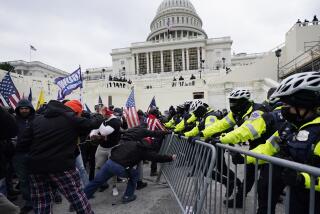Election denial returns as focus with Vance’s ‘non-answer,’ new Trump indictment details

- A poll found that just 31% of Republicans said they believe Biden was legitimately elected.
- Trump called Smith’s case against him a “SCAM,” and suggested the timing of the filing so close to the election broke with Justice Department rules.
In the waning minutes of Tuesday night’s vice presidential debate, Gov. Tim Walz hit on a question that has become central to the 2024 presidential race — and to America’s political future more broadly.
Walz, who is Vice President Kamala Harris’ running mate, was sparring with Sen. JD Vance, former President Trump’s running mate, over the Jan. 6, 2021, attack on the U.S. Capitol by Trump supporters intent on overturning the 2020 election of President Biden.
Walz called the attack “a threat to our democracy,” and one driven by Trump’s refusal to admit defeat. “He is still saying he didn’t lose the election,” Walz said to Vance. “I would just ask that: Did he lose the 2020 election?”
Vance, unwilling to buck Trump’s false claim that the last election was stolen, said he was “focused on the future.”
“That,” Walz said, “is a damning non-answer.”

The next day, the issue was again magnified for voters when a federal judge in Washington released a new court filing from Special Counsel Jack Smith, in which Smith provided the most comprehensive accounting to date of what prosecutors allege was a sweeping criminal conspiracy by Trump and his allies to not just deny the election, but also subvert it.
“When [Trump] lost the 2020 presidential election, he resorted to crimes to try to stay in office,” Smith wrote.
Taken together, the two episodes served as a stark reminder of something Democrats have been eager for voters to focus on in the current race: the former president’s alleged willingness to undermine the will of voters in the last one.
State elections officials, independent elections experts and most Americans agree today that Biden’s victory over Trump was legitimate. Despite substantial efforts to do so by Trump’s backers, no one has produced evidence of substantial voter fraud or election irregularities, and experts have concluded there were none.

Democrats have condemned Trump for his dishonesty and impeached him in the House for inciting the Jan. 6 attack, and Smith and prosecutors in Georgia have indicted Trump for his alleged scheme to remain in power illegitimately.
Trump, meanwhile, has maintained his position that the election was stolen from him, and many Republicans still believe the same. A Washington Post-University of Maryland poll in December, for example, found that 62% of U.S. adults said they believe Biden was legitimately elected. While 91% of Democrats believe it, just 31% of Republicans do, the survey found.
Trump has downplayed the Jan. 6 attack and promised to pardon those convicted in the fray. He also has begun already to cast doubt on the legitimacy of the upcoming election.
An analysis of the words Vance and Walz used most often to state their cases in vice presidential debate.
As voters begin casting their ballots in the current race, political experts say they will be weighing a host of issues, including the economy, immigration and reproductive rights. But particularly after the last week, they also may be thinking about Trump’s election denial and the fallout from it, the experts said — and for good reason.
“It’s not just about denying 2020,” said Bob Shrum, director of the Center for the Political Future at USC. “It’s about whether or not you are going to uphold the fundamental precepts of democracy.”
“It should be a major issue for voters,” said Richard L. Hasen, director of the Safeguarding Democracy Project at UCLA Law, “because, really, it was an unprecedented attempt to steal an election.”
More than just denial
After Smith’s lastest filing was released, Trump went into a rage on his social media platform Truth Social, accusing the Justice Department of “COMPLETE AND TOTAL ELECTION INTERFERENCE” and saying he did “NOTHING WRONG.”
Trump called Smith’s case against him a “SCAM,” and suggested that the timing of the filing so close to the election broke with Justice Department rules for avoiding unnecessary political influence.
The timing is in part due to Trump’s own efforts to fight the case. It was on an earlier trajectory before Trump appealed to the Supreme Court — which found in an unprecedented ruling in July that presidents enjoy broad immunity for actions taken as part of their official duties.
Smith’s latest filing is a response to that ruling and a detailed articulation of why Trump’s actions to subvert the 2020 election were taken not in his official capacity as president, but in his private capacity as a losing political candidate — and therefore not something for which he enjoys immunity.
The filing details how Trump allegedly “laid the groundwork for his crimes” well before the election even occurred, including by telling advisors that he would claim victory before ballots were even counted, and how he continued to push his election fraud narrative long after he was told, repeatedly, that no such fraud existed.
Smith wrote that Trump conducted a “pressure campaign” targeting Republican leaders, election officials and election workers in states he had lost in an effort to change the outcomes there — such as when he told Georgia Secretary of State Brad Raffensperger that he wanted to “find 11,780 votes,” a margin that would have won him that state.

When those efforts failed, Smith wrote, Trump personally set into motion and monitored a brazen plan to send fake slates of electors to Washington to cast state electoral votes for him instead of Biden, who had won them. He continued his “stream of disinformation” on Jan. 6, Smith wrote, falsely suggesting Pence could unilaterally halt the certification of Biden’s victory and motivating his supporters to storm the Capitol.
Hasen said all Americans should read the filing to get a “good picture of the depths to which Trump was willing to go to try to turn himself from an election loser to an election winner.”
Most important, Hasen said, is the number of times it shows Trump ignored evidence that he lost.
“Just in terms of the morality of it, to know that the election was not stolen and to keep claiming it and undermining American democracy is incredibly dangerous and deserving of condemnation,” Hasen said.
Why it matters
Trump claims that a vast majority of Americans feel the 2020 election was rigged. It was not, and they do not, according to polling. However, a sizable minority do feel that way, and many leading Republicans have done little to dispel the notion.
During the debate, for example, Vance downplayed the historic threat of the Jan. 6 attack and suggested that Trump had adhered to democratic standards by ceding power to Biden at his Jan. 20, 2021, inauguration.
“It’s really rich for Democratic leaders to say that Donald Trump is a unique threat to democracy when he peacefully gave over power on January the 20th, as we have done for 250 years in this country,” Vance said.
In fact, Trump refused to attend Biden’s inauguration, making him the first president in 150 years to skip one.
Walz accused Vance of advancing “revisionist history,” and the next day told reporters that it should be “disqualifying” for Vance to not acknowledge Biden’s victory.
Experts said such election denial is indeed a serious issue, and a dangerous thing for Trump and Vance to advance.
Child care and paid family leave took priority as Walz and Vance sparred at the vice presidential debate. Here’s why these issues are finally bursting into the spotlight.
Sophia Lin Lakin, director of the Voting Rights Project at the American Civil Liberties Union, said her organization is involved in dozens of legal actions across the country in advance of next month’s election, from groups that she said are “setting the stage for this narrative that there is something nefarious at play, that there is something questionable, that the results of the election aren’t valid.”
The litigation is clearly part of a broader strategy, largely on the political right and clearly borne out of what happened in 2020, to “launder” legitimacy for later election denial claims through the legal system, Lakin said.
Sean Morales-Doyle, director of the Voting Rights Program at the Brennan Center for Justice at New York University, agreed.
“The effort to overturn the outcome of the 2020 election and everything that followed did kind of spawn a whole election denier movement that has proliferated and has been funded and has been pushed forward by not just Trump but a number of other prominent figures, and it has led to a situation in 2024 where there is a much broader, more coordinated effort to undermine faith in our elections, to sow distrust, and to set the stage to subvert the outcome of elections in 2024,” Morales-Doyle said.
That said, both he and Lakin said there is room for hope. Among other things, prominent election deniers who ran for election offices in swing states in 2022 were resoundingly defeated, they noted. And some states have passed new laws since 2020 to shore up election systems and make frivolous challenges to election results more difficult.
Morales-Doyle said he wants people to be aware of election denial and the threats it poses, but also to not get discouraged by it — because the evidence shows American election systems are strong, and thinking otherwise based on misinformation only serves to weaken them.
“The best way to respond to these unprecedented attacks is to buy into democracy, to participate, to go and vote,” he said.
Shrum said Vance was clearly “talking to an audience of one, Donald Trump,” when he wouldn’t answer Walz‘s question about the 2020 election, but that his doing so didn’t do Trump any favors.
“Trump has convinced a substantial part of his base, of the people who are voting for him, that there was something wrong with the election, but I don’t think Americans generally think that,” Shrum said. “In fact, it drives voters away.”
Polling shows that many Americans take a dim view of election denial. One recent Monmouth University poll, for example, found that 58% of Americans believed that an unwillingness to accept election outcomes was a “major problem” for the country.
Republican elections officials are among those expressing concerns.
Late last year, the Johns Hopkins SNF Agora Institute and Gallup released polling that showed that only 40% of Republicans were very or somewhat confident in the accuracy of U.S. elections. Along with the polling, a group from Johns Hopkins and the conservative-leaning think tank R Street Institute released a set of “core principles” for restoring that trust — including having conservative leaders publicly affirm election system security and champion policy changes that build trust.
“As Republican state election officials, we believe in the power of citizens to choose their leaders freely and fairly, and we have faith in the integrity of election systems in place to carry out the voters’ will,” said the group’s members — including Raffensperger of Georgia, Idaho Secretary of State Phil McGrane, Kansas Secretary of State Scott Schwab and Utah Lt. Gov. Deidre Henderson. “We are also worried. Our democracy cannot hold if its citizens do not trust that elections accurately reflect the will of the people.”
Charles H. Stewart, a political science professor and director of the MIT Election Data + Science Lab, said many Americans already understand — at least in broad strokes — that Trump denied the election and worked to reverse the results.
Stewart doesn’t expect Smith’s latest filing or Walz’s debate efforts to swing voters in any major way, but said they “may keep the issue more visible” and increase the “enthusiasm” for voting among those most appalled by Trump’s actions.
Hasen said he hopes more Americans work to understand the full implications of Trump’s election denial, and vote accordingly.
“The question of whether we will have peaceful transitions of power,” Hasen said, “should be one of the top things on every voter’s list of considerations.”
More to Read
Get the L.A. Times Politics newsletter
Deeply reported insights into legislation, politics and policy from Sacramento, Washington and beyond. In your inbox three times per week.
You may occasionally receive promotional content from the Los Angeles Times.













